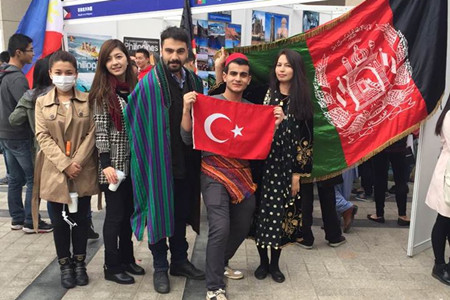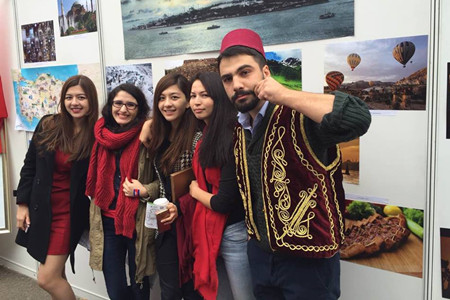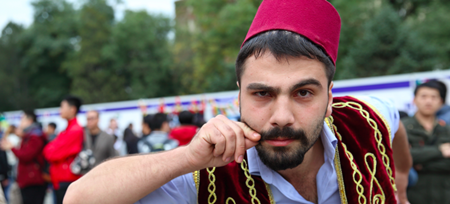Peking University, Sep. 5, 2016: Although Turkey officially recognized thePeople’s Republic of China in 1971, contact between the Turkish and Chinese peoplegoes back much earlier, to the times when traders carried precious Chinese cargo from southern China across the Gobi Desert to the last land stop on the Silk Road – coastal Turkey. Now, with the development of the “One Belt, One Road” program and China’s expanding investmentsin Eurasian nations, Chinese and Turkish people are finding themselves collaborating more and more often. Many Turkish students at Peking University came to study in China over the West because although Sino-Turkish relations are becomingincreasingly important, Turkish people with Chinese expertise are few and in high demand.
When Dr. Ali Aydinarrived at Zhejiang University in 2004, he was the first international student the school had ever enrolled. Without knowing a word of Chinese, his professors improvised a pre-university language program for him while waiting for Chinese textbooks to arrive in the mail. Dr. Aydin haddecided to come to China after only hearing about a hometown friend doing business in China,who described to him the amazing business and academic opportunities available there.Dr. Aydin had his passport and visa taken care of, and the day after uprooted his life to board a plane to China. Now, twelve years later, Dr. Aydin is the first and only Turkish person to have finished his bachelors, masters, and doctoral degreeall in China, and is now a professorat Peking University’s Turkish Language and History Department, which was established in 2013. At PKU, he teaches about twenty undergraduate students. One of his students, Cai Yuxuan from Yuanpei College, decided to study Turkish language and history partly because of her interest in religious studies. She writes that the religious and ethnic diversity of the Ottoman Empire is fascinating, especially the conversion of churches and mosques throughout history.
Yuxuan’s interest is not unusual, as Turkey is a diverse country and is widely considered one of the most striking meeting places of East and West. Many Turkish students have noted similarities between the Eastern elements of their culture and Chinese culture. Ali Karakaya, a student in the School of International Studies, thinks that two of the biggest similarities are family and food. Like Chinese, Turkish people also emphasize the importance of family. Moreover, Hamza Ucar, a student of Yenching Academy, said that the large Chinese courtyard houses where several generations live together remind him of traditional houses in the Turkish countryside.Ali said that food as well is an extremely important part of Turkish culture, just as it is in Chinese culture, but there are a few key differences. The first is that Chinese people talk and laugh over a long dinner, while Turkish people first enjoy the foodand then chat over after-dinner tea or coffee. Hamza said that all important family meetings are held over thedinner table. Another important difference, according to Hamza, is breakfast. When asked about what he misses most about Turkey, Hamza says “A lot of things, but mostly… Breakfast.”Chinese breakfast cannot compare with Turkish breakfast, according to Hamza, which includes a variety of olives and cheeses, and is meant to be savored. Despite these similarities, many of the Turkish students experienced culture shock when they first arrived. Ali says that the unfamiliarity of Beijing really struck him when he first arrived, and Hamza related a story about sitting in a noodle shop for hours trying to eat with chopsticks for the first time. He failed, he told me, and took the noodles home to eat where he could find a fork.

Many of the Turkish students at Peking University are Muslims and eat Halal food, which is rather convenient in Beijing. Beijing is home to a very old Muslim community, the majority of which are ethnically Hui Chinese. Nongyuan Canteen has a Halal section, and the Tongyuan canteen next to the building of the School of International Studies is especially designated for Halal food. At the Tongyuan Canteen, many Turkish students, who I interviewed, have gotten to be identified themselves as local Hui Chinese or other international Muslims, with whom they bond over Halal food and their common religion. Other cafeterias on campus are often crowded, but Hamza enjoys that Tongyuan is a quiet and intimate place where it is much easier to get to know people. Hamza claims that in Europe he has never seen a Halal canteen on a university campus, and that he appreciates the support PKUhas offered toMuslim students. Ali and Esat Saglam, a student from Yuanpei College, regularly attend Friday prayer at the nearby Haidian District mosque. Also, Alitold me that for him, attending prayersis to meet people and join a new community brought together by Islam, which has an extremely long and colorful history in China.

Peking University is a melting pot of international cultures, where students from all over can share their diverse experiences. Esat originally planned on becoming a film director, but after coming to China and studying at Peking University, hebecame interested in pursuing a career in academia instead. He finds Peking University an excellent place for intellectual and cultural exchanges, and believes that anacademic is similar to a director in that they both have “valuable things they would like to share in artistic ways,” and PKU “represents a very good start of an academic career”. Turkish students such as Esat, as well as all international students at Peking University each contribute a small bit of diversity to the campus. With China placing more and more emphasis on international cooperation, wecan expect more students from Turkeyand all over the world to come to China and participate in intellectual exchanges at Peking University.


